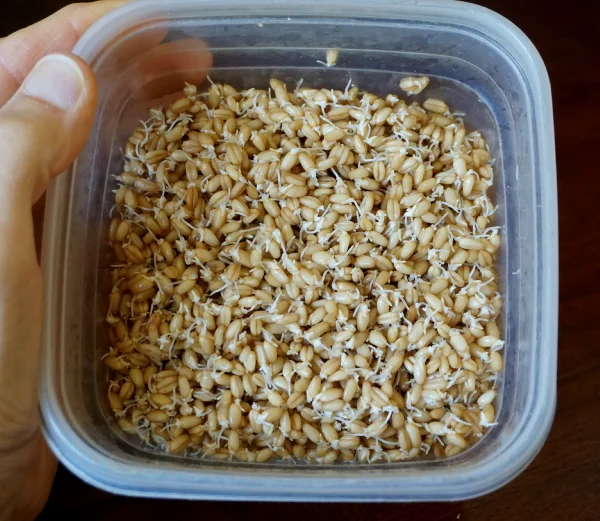Our memories also affect what we like
Although we have genetic
preferences
for certain tastes, visual patterns, sounds, and odors, what we like
and dislike is affected by our environment. Specifically, the memories
that we associate
with something.
We usually do not apply this concept to humans, but
we use it for training animals. For example, we teach an animal to poop
outside of the house by doing something irritating if he poops in the
house, such as yelling at him, or making some unpleasant noise.
This results in the animal accumulating unpleasant memories that are
associated with pooping in the house. As a result, when the dog is
inside the house and feels the need to poop, his mind will recall those
unpleasant memories, and he will want to avoid experiencing the
unpleasant situation again. This will cause the dog to believe that he
"likes" to poop outdoors when in reality he doesn't care where he does
it.
In regards to humans, as we grow up, we accumulate memories about food,
hairstyles, clothing styles, recreational activities, material items,
and jobs. If our mind associates something with pleasant
memories, we
will assume that we like it, but
if we have unpleasant
memories
associated with it, we will assume we dislike it.
It might be easiest to understand how this process works by observing
the misfit
children. The children who have mental disorders will
frequently be scolded by adults, and insulted or tormented by other
children, resulting in a lonely,
unpleasant childhood. Those misfit children can associate their
unpleasant memories with the hairstyles, clothing styles, foods, or
material items that they see on the people who ridicule them.
For example, if a young girl is frequently insulted by adults who are
dressed in "conventional" clothing, but if the people dressed in the goth style treat
her as a friend, then she will develop unpleasant
memories for people wearing the conventional
style, and pleasant
memories of people who wear the goth
style.
This can fool the girl
into believing that she likes
the goth style, and he dislikes
the
conventional style, when in reality, the human mind doesn't care which
style of clothing we wear.
|

|
|

|
|
A
child who associates a particular clothing style with unpleasant
memories will dislike that clothing style.
|
|
A
child who is comfortable around misfits will
have pleasant
memories of their clothing, hair, and activities.
|
Another example of this
concept is the words
that we
like and dislike. For example, if a person develops unpleasant memories
for the words midget or fat,
then when he hears those words, those unpleasant memories will be
stimulated. This can fool the person into believing that the words are
cruel, hateful, or harmful.
This in turn can lead him to the idiotic
conclusion that his life will improve if we switch to words that do not
evoke unpleasant memories, such as referring to midgets as "little
people," and referring to a fat person as a "plus sized" person.
As with all issues that we face today, this issue is more complex than
it appears. For example, to some adults, the words "shit" and
"diarrhea" evoke unpleasant memories. Therefore, when we are eating a
meal with people who routinely use those words in their conversations,
we are reminded of those unpleasant images and odors throughout the
meal. Our meal would be more relaxing and enjoyable if we eat with
people who do not use those words.
When I was a child, I was not bothered by diarrhea or vomit, so I and
other children could talk about those issues while we were eating
without being annoyed. As I grew older, I developed a distaste of those
issues. However, the adults who are not bothered by those issues will
have no problem discussing them while they are eating. Many adults are
even amused by such things as " Mr.
Hankey", or one the many types of " poop
toys".
What is the difference between someone like me, who does not want to
have a meal with people who use the word "shit", and a midget who does
not want us to use the word "midget"?
The difference is subtle. I don't want to hear the word "shit" while
I'm eating because it represents a concept that I find unpleasant. It
is important to realize that I don't want people to switch to a
different word, such as "poop", "bowel movement", or "digestive end
product." I am not asking people to use an alternative word because it
is not the word that bothers me. It is the concept that the word
represents.
To further complicate this concept, I prefer the word "poop" over
"shit" because of the memories I have associated with "shit". That word
evokes two different groups of memories. One is the waste product, and
the other is the low-quality people who frequently use that word.
Therefore, the word "shit" evokes memories of unpleasant people, and
the waste product, whereas "poop" evokes only the memories of the waste
product.
By comparison, the midgets who complain about the word "midget" believe
that the word is ruining their life, and that by switching to an
alternative word, their life will improve. They are blaming the word,
not the concept that the word represents.
I suspect that they are upset with the word midget because it reminds
themselves of what they are, which is a genetically defective freak of
nature. They do not like themselves. They will boast about being
midgets, and claim to enjoy it, but they are simply trying to make the
best of a miserable situation. Nobody wants to be a midget, or
retarded, or a dwarf, or obese. Nobody wants a child to be these
things, either. All of the people who are claiming to love their
homosexuality, their mental illness, their dwarfism, and their other
problems are simply liars who are trying to make themselves feel
better. They are people who cannot face reality.
I can accept my problems. I don't whine that people should stop
referring to me as scrawny or bald. I would not even care if people
said I'm a "retard with a thyroid problem".
What is a "retard"? We could define the word to include people like me
who have a genetic disorder that is so serious that we would have died
at a young age if we had been born during prehistoric times. People
like me are alive today only because of modern technology.
I do not like my defects, would not want to have a child with my
defects, and do not want other people to suffer from these defects, but
I can accept my defects. I do not lie to myself and pretend that I love
being bald, or that one of God's greatest gifts to me is a thyroid
problem.
There are undoubtedly some midgets who can accept their problem, but
there are other midgets who cannot. We should not pander to
the people who cannot accept their problems.
Everybody has imperfections, and we should consider the people who
cannot acknowledge or accept their imperfections as the lower quality
people. If we pander to them, we encourage more of their whining.
I think the people who are whining about such pronouns as " he" and " she", and demanding that we refer to
them as
"they" or "zir" are people who don't like their sexual disorders, and
cannot accept their problems.
The word " nigger" is a more
complex example of this concept because we have both good and bad
memories of that word. The bad memories are of white people
using the
word to insult black people, and the good memories
are of black people
using the word in ordinary conversations, songs, and jokes.
The result of these memories is that when a white person uses the word,
unpleasant emotions are triggered by the bad memories, and that
causes black people to pout or become angry.
However, when black people use the word, then everyone, not just black
people,
are reminded of ordinary conversations, so nobody is
bothered by their use of the word.
American culture is treating the word "nigger" in an irrational
manner because most people allow their emotions to react to the word,
rather than use their intellect to think about the word. If people had
more self-control and would think about the word, they would realize
that it is just as harmless as all
others. Even more interesting, as I pointed out here, we could regard the
word as an insult to white people
who cannot pronounce the word "Negro", rather than as an insult to
black people.
Another example of how our memories affect what we like is that the
only memories that most of
us have about the game of polo
are photos or television images of wealthy people watching that game
while drinking a " complimentary
bottle of Veuve Clicquot"
or other expensive champagne. This can cause us to associate that game
with people who are high in the social hierarchy, which can result in
us liking the game.
Conversely, if we have been repeatedly failing
to become high in the hierarchy, and if we are angry
as a result, we might associate polo with the miserable memories of our
failures, which can result in us not wanting to be reminded of polo.
This can cause us to assume that we dislike
polo.
Incidentally, the "complimentary" bottle of
champagne at a polo game brings up two
important issues.
1) How many wealthy people notice
the exploitation?
The "complimentary"
bottle of champagne is not truly
"complimentary". The people are paying for the champagne when they
purchase a ticket to the polo game, but they are told that the
champagne is complimentary in order to titillate their emotional
craving to feel special. This is another an example of how the free
enterprise system is favoring the business executives who can find ways
to exploit
our emotions, rather than provide us with guidance.
The poor people believe that they are exploited by wealthy people, but
the wealthy people exploit everybody,
including other wealthy people. A lot of the wealthy people also
exploit land, water, animals, and plants.
How extreme does the exploitation have
to be before the wealthy people realize that they are being
exploited just
like the poor people? For example, imagine the Liberty
National Golf Club offering dinners in this manner:
|
Lemon chicken
with complimentary champagne
- $300
Or how about:
Pork chops
with
complimentary Rolls-Royce Phantom
- $465,000
|
 |
2) Our leaders are promoting alcohol
The complimentary
champagne is another example of how the people in
high status positions are pushing alcohol
on us. Imagine if a game of polo was providing complementary cocaine or Viagra.
It would be more beneficial
if the influential people would
promote something sensible and
desirable,
such as orange juice from freshly squeezed, ripe oranges that are free
of unhealthy chemicals.
We must set higher standards for leaders
No society yet has
any standards for influential people, and the result
is that modern societies have become dominated by lunatics, criminals,
pedophiles,
crime network members, and people who inherited their money or became
wealthy through divorce settlements. They are not people
who provide us with guidance. They are people who exploit us, and exploit
one another.
|
Our ignorance affects what we like
We are not aware of how
ignorant we are. We like or dislike things according to our memories of
it, but we are never aware of whether our memories are providing us
with an accurate understanding
of it. For example, some adults that I know told me that they do not
like cantaloupe melon, but when I gave them a piece of a particular
melon ( referred to as "Sugar
Kiss Melon"), they were shocked to discover that they love it.
They disliked cantaloupe simply because they had accumulated unpleasant
memories of cantaloupe, and they assumed that their experience with
cantaloupes has caused them to become experts
on
cantaloupe, but their memories were only of the typical cantaloupes
that are sold in the American markets, which I agree are such terrible
quality that they are not worth
purchasing.
The Sugar Kiss melons are available only at some
markets, and they are usually more expensive, which results in a lot of
people
avoiding them. The higher priced items are not necessarily better than
the lower-priced items, but they are better
with this
particular brand of
cantaloupe. ( Their honeydew melon, Summer
Kiss, is also fantastic.)
None of us is aware of how ignorant we are about cantaloupes, apricots,
recreational activities, courtship activities, city planning,
transportation systems, clothing styles, or other aspects of the
universe. We like and dislike things without realizing that we have
only a partial
understanding of it, and that we might change our minds
about what we like and dislike if we had more information.
|
Each
of us should
occasionally remind ourselves that we are analogous to one of the blind
men in the story
of the blind men and the elephant. We are not nearly
as knowledgeable as we like to believe we are. |
|
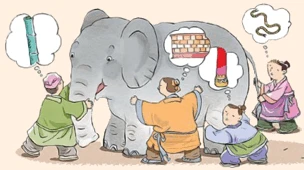 |
 |
|
How accurate
is your
knowledge?
|
Furthermore, in addition to
having only a small amount of knowledge,
we don't know how
accurate
any of our knowledge is about foods, health, allergies, Jesus Christ,
the world wars,
the 9/11 attack, the Holocaust, or Anne Frank's diary. Some of that
information has been proven to be lies or fantasies.
Modern humans should understand that being "educated" does not
guarantee that we have complete or accurate
information. Therefore, we must be
very critical about the information that we put into our memories.
In a free enterprise system, we purchase the products that we like, and
we avoid those that we dislike, but none of us truly has a good
understanding of the products that are for sale, or what we like or
dislike. We are ignorant
people making
decisions on incomplete and faulty information.
Unfortunately, even if we
had more information, and more accurate
information, most people would not be able
to make a wise decision about what they like or dislike simply because
most people are only capable of making "average" decisions, and half of
the population will make decisions that are below-average.
Most people cannot make "wise" decisions about anything. They cannot make wise
decisions about which political candidate to elect to the government,
or how to raise children, or how to treat their spouse.
College
students are supposed to be above-average in
intelligence, but most of them cannot make wise decisions about what to
study, or how to spend money, resulting in many of them accumulating
large
debts and a useless education.
Most people would have a more satisfying life if they had less freedom and more guidance and leadership.
Nobody truly understands
himself
We can alter what we like
and dislike by altering our
culture. By changing the foods we eat, the way we prepare meals, the
design of
our city, and our recreational activities, we can change what we like
about life. For some examples:
•
|
|
If children are
raised in a culture in which the foods for children have low
sugar levels, then they
will like
those foods because they will have no memories or awareness of
extremely sweet cereals, candies, and desserts.
|
|
|
|
•
|
|
If a person who
enjoys watching polo
games were to live in a city as I suggest in which
there is no wealthy class to give polo an image
of high status, and in which the city officials routinely experimented
with
recreational activities, and if the culture encouraged people to participate in activities rather
than watch other people, then
he might discover that he has more fun
participating in other
activities. He might come to the conclusion that polo is a dangerous
sport that is too difficult for most people to participate in, and that
it is a burden on society.
|
|
|
|
•
|
|
 A
person who
dislikes bicycles
might discover that he enjoys
bicycles if he
is living in a city as I suggest in which he has free
access to
all types and varieties of bicycles, all of which have been designed to
be
comfortable and reliable rather than to titillate ignorant consumers,
and
in which the city handles the storage and maintenance, and provides the
people with lots of
beautiful bicycle paths, and the bicyclists do not have to share the
roads with automobiles or other vehicles. A
person who
dislikes bicycles
might discover that he enjoys
bicycles if he
is living in a city as I suggest in which he has free
access to
all types and varieties of bicycles, all of which have been designed to
be
comfortable and reliable rather than to titillate ignorant consumers,
and
in which the city handles the storage and maintenance, and provides the
people with lots of
beautiful bicycle paths, and the bicyclists do not have to share the
roads with automobiles or other vehicles.
He might also discover that
he enjoys riding on the elevated
bicycle paths that allow him to get
close to the flowers of the Jacaranda trees and flowering plums, and
which allow him to ride over creeks, rough terrain, and the artificial
lakes and islands.
|
|
|
|
•
|
|
A person who dislikes
pork, or who
likes to put applesauce
on pork, might discover that he loves to eat pork with nothing on it
when he is living in a
city in which he is provided with fresh pork
that is cooked at a low
temperature.
|
We should experiment with our culture
We must stop believing that
we know what we want and find the courage to look critically at ourselves, and experiment with our
options. We must acknowledge that we are animals,
and we must exert self-control
over our animal cravings. We must push ourselves
into being much more critical of our thoughts, feelings, and
beliefs, and push ourselves into looking favorably at other
people's opinions.
When somebody behaves differently, has a different opinion, or has a
different preference for food, clothing, art, or home decorations, we
have an emotional preference to insult them for being weird, crazy, or
having bad tastes. We
should instead suppress our
craving to feel superior. We need to make a distinction
between when a person is behaving in a detrimental
manner, and when he is simply different
from us.
We should push ourselves into wondering why a person
is different from us. By analyzing people who are different, we have
the opportunity to learn more
about the human mind, life, and our options.

Prehistoric children did not grow up with
comic strips, movies, television shows, and other
types of "entertainment" that frequently treat sarcastic and insulting
remarks as clever
and amusing.
For example, the Parade magazine has this
document with 100 "Good Comebacks" and "Sick Burns", but we should not
admire people who can create or repeat such insults.
Businesses in a free enterprise system provide us with that type of
entertainment because we enjoy feeling superior to one another, but
promoting insults as "cleverness" encourages children to make insulting
remarks. It stimulates their arrogance, and their desire to make other
people feel inferior.
We should not regard people who make insulting remarks as being clever.
It takes a lot of talent to provide somebody with useful constructive
criticism, but it doesn't take talent to ridicule him. We will never improve
our lives if all we do is insult one another. We need to analyze our
problems and experiment
with improvements.
We have strong attractions to democracies and free enterprise systems
because they give us what we want, but
pandering to our animal cravings will not provide
us with the most satisfying life. I suggest raising
children in an
environment that encourages them to suppress their arrogance and treat
other people as friends.
We all believe that we know what we like in regards to
food, recreation, marriage, jobs, and everything else, but we don't
really know much about ourselves or reality. We need to be more
critical of ourselves, and be more willing to experiment with our
options.
A description of a meal can
help us enjoy it
Getting back to the issue
of restaurants providing us with descriptions
of our food, I think those descriptions can compensate for some of our
crude mental
characteristics. Beautiful, color photos or videos of our
meal, including the ingredients, can help us to relax, enjoy the
meal, and correctly interpret the
flavors and odors.

Many Japanese restaurants
create displays of plastic food items to show people the meals that
they offer. An example are the desserts in the photo to the right.
Those type of displays might be useful in Kastron, also, at least for
the foods that we are not familiar with.
The photos and descriptions of the
food would be especially useful for when restaurants
provide us with subtle variations of
a food that we are accustomed to eating. For example, when we eat beef
stroganoff, our mind expects the flavor and texture to match our
memories of previous meals of beef stroganoff, so if a
restaurant provides a beef stroganoff with some different
ingredients,
our mind will notice that it doesn't match our memories, and that can
trigger our fear of the unknown,
which in turn can cause our mind to be concerned that the food is
rotten or contaminated.
That irrational emotional feeling will make it
difficult for us to enjoy the meal. By providing a description and
photos, we will
realize that it tastes different because it has different ingredients,
and/or the ingredients are in different quantities.
Incidentally, there are a lot of people that enjoy calligraphy and art,
so instead of wasting their time on projects for themselves, they could
create decorative descriptions of our meals, thereby doing something
with their talent that we appreciate, as I described with jigsaw mosaics.
For example, they could describe the ingredients, and even the cooking
method, of our dinners in a book that is a modern version of a medieval
illuminated
manuscript, as in the image below. Each evening we would turn to the
page in that book that shows us the meal that we are being served that
particular evening.
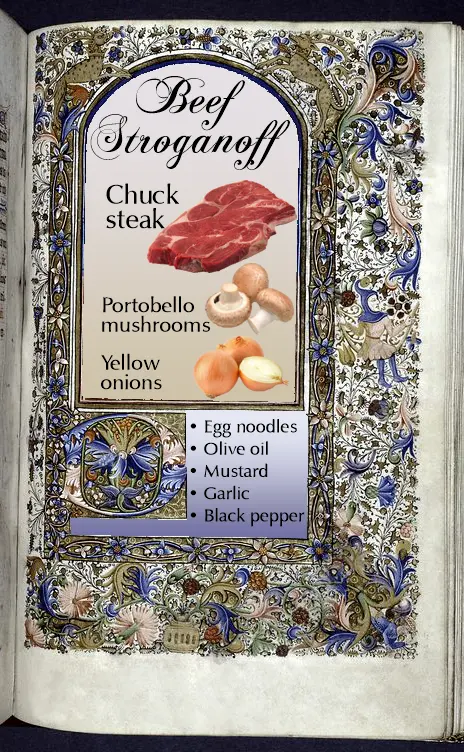
On another evening, we
might be served a different
type of beef stroganoff, and a description
of its ingredients would reassure our emotions that the different
texture and flavor is the result of different
ingredients, rather than because the food is contaminated or
rotten.
We should restrict our “food freedom”
Having the freedom to
choose our foods is useful only
if
we know more about foods than anybody else. Otherwise we will benefit
by having a
group of more knowledgeable people create meals for us.
Almost everybody believes that they are such an expert on food and
health that they don't need to listen to anyone else's advice, but none
of us knows much about foods or health, or what
will truly provide us with the most satisfying life.
Unfortunately, nobody is an expert in foods or health, so nobody can
provide us with truly wise advice. However, some people are capable of
making better decisions than the majority of
people.
The majority of people regularly make "average" decisions about food
and health, rather than "wise" decisions. The end result is that most
people eat
excessive quantities of food,
and the food tends to have excessive
amounts of sugar, fats, and salt.
This in turn causes a significant percentage of the population to
become overweight, sickly, or suffer from an abnormal amount of
digestive problems, farting, burping, constipation, and diarrhea.
My suggestion to improve this situation in Kastron is for the
scientists to design meals. The restaurants
will not provide people with
menus. Instead, each restaurant will have a schedule of upcoming meals, as in
the cartoon of the Jetsons that I modified ( farther above).
We would choose the restaurant we want to eat at,
which allows us to choose the type of food we want to eat, but all
of the meals will have been designed by a
group of scientists to ensure that the meals are providing adequate
nutrition.
This policy will allow the scientists to prevent the restaurants from
providing children with excessively sweet and worthless foods.
Furthermore, this policy will allow the scientists to change the
recipes whenever they learn more about nutrition, and they will not have to
conduct advertising campaigns to plead with the public to try the new
recipes, as the beer businesses had to do when they first offered beer
that was lower in alcohol or calories. The first of those
beers, from Coors, was not very successful, but Miller had more success a
few decades later with a much more intensive advertising campaign.
However, that advertising wasted a lot
of labor and resources.
I also suggest we put more resources into developing robots to make
meals
for us, and to clean up the mess afterwards. The sous vide method of
cooking is especially easy for robots, so there is no reason for
people to bother with that chore.
There is nothing wrong with sweetening our food
Although I frequently
criticize sugar, there is nothing wrong with
sweetening our sauces, breads, or pizzas, or even our meat and egg
products. My complaint about sugar is that most people are eating excessive amounts of
it.
There are several methods to reduce our consumption of sugar. One is to
raise children on foods with lower sugar levels so that they become
accustomed to low levels of sugar. Fruits are naturally
sweet, and I think that fruit should be the only sweet foods that
children have access to. I suggest prohibiting
children from
having access to candy and sweet desserts so that they do not become
accustomed to
"abnormally" sweet foods.
In a free enterprise system, restaurants pander to everybody, including
children, and this results in businesses promoting
meals like the one below, which the Rachael Ray television program
describes
as one of the " Kid-Friendly"
recipes.

Those foods are referred
to as " kid friendly"
because the high sugar levels titillate children, but it would be more
accurate to describe those recipes as " food
pornography for children".
A democracy and a free enterprise system encourage us to do whatever is
most titillating, but
children need guidance
from the adults, not excessive emotional stimulation that results in
them developing unhealthy, worthless, or destructive attitudes,
desires, and goals. Raising children on abnormally sweet foods is
encouraging them to become adults who want to continue consuming
excessive amounts of sugar.
We should change our
attitudes towards life. We should stop promoting the attitude that we
can improve the life of a child by pandering to him rather than giving
him guidance and making him learn how to
take care of himself and deal with problems.
Adults also need guidance, but the businesses in a free enterprise
system are in competition to titillate adults with the most emotionally
satisfying foods, rather than provide us with healthy meals.
Furthermore, many restaurants in the USA are titillating adults with large amounts of food, rather than
adjusting the quantity of food to be appropriate for each person.
There is nothing wrong with adults eating sweet foods, but we should
look for methods to reduce our sugar consumption, such as replacing
some of the sugar with a sweet alternative. The US government promotes
aspartame and sucralose, but our government is too corrupt and
incompetent for us to trust, so I recommend that the Kastron government
conduct their own analyses of sugar substitutes.
We can also reduce our sugar consumption by reducing or eliminating the sugar that we put into the
dough of some bread products, and put powdered sugar or a sweet sauce on top of the
final product. For example:
|
1) |
|
Instead of
putting
sugar into
the dough for pancakes and cookies, we put powdered sugar or a sweet
sauce onto
them.
It is common for people to sprinkle powdered sugar onto lemon bars (photo)
and cookies, but
most people also put a lot of sugar into
the dough.
|
|
 |
|
|
|
|
|
|
|
2)
|
|
Instead of making
sweet breads, such as cinnamon raisin
bread and cranberry orange bread, we make a
"plain" bread and spread a sweet sauce on top of it,
such as a cinnamon raisin sauce, or a cranberry sauce (photo).
Some
sauces could be so thick that we spread them with a knife, and some
could be so thin that
they create a "bowl
pizza" that we eat with a spoon.
|
|
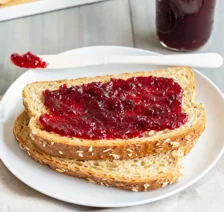
|
From my
personal
experiences with sugar, if the same amount of sugar that we put into
the dough is put onto the surface, the
item will appear sweeter, thereby allowing us to reduce the amount of
sugar we use.
The sauces can also solve the problem of bread products that are so dry
that we
want to coat them with butter, coconut oil, olive oil, or other fat,
but most of us already consume excessive amounts of fats. Furthermore,
we prefer salty
fat, so increasing our consumption of fat usually increases our
consumption of salt, also.
 In order to
eliminate sugar from the dough, we would have to change the way we make
certain food items. For example, instead of making a cake from one or
two thick
layers, we would make thin layers so
that every bite has some of the sweet, moist filling, similar to the
cake
in the photo
to
the right.
This concept can also be
used to reduce our consumption of salt.
Specifically, by sprinkling powdered salt
on the surface
of a bread product, or putting salt in a sauce, rather
than incorporating the salt in
the dough, we will consume less salt.
For certain foods, we can add tiny amounts of salt to the surface by
spraying them with a mist of
salt water. That causes the food item to become wet, but for
some
items, such as slices of avocado, that does not matter, and for other
food items, the water can be evaporated by letting it sit for a while,
or by warming or toasting it. For example, I cook mushrooms in a
toaster oven, and I now spray them with salt water to give them a
minuscule amount of salt before I put them into the oven. That avoids
the problem of accidentally adding excessive amounts of salt after they
have cooked.

If some business would
create a high
quality salt grinder, we could use it to create powdered salt
when we need it. That would allow us to avoid the impossible task of
keeping powdered salt dry in humid climates.
I have only tried a few different brands of salt grinders, and most of
them are terrible, but the OXO
model I bought at a local retail store ( photo
to the right) is working nicely. However, I have to keep it upside down to reduce the
dribbling of salt. Fortunately, it is stable upside down.
We can also reduce our
consumption of sugar by allowing fruit to ripen before
we harvest it,
thereby reducing the quantity of bitter chemicals in the fruit, which
in turn
reduces the amount of sugar we want to add to jams, pies, granola bars,
and
other fruit products.
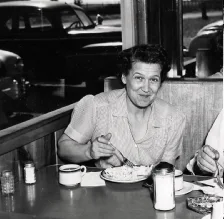
|
|
The large
container has sugar.
Click to see entire photo.
|
A person could consume excessive amounts of sugar
and salt if he had access to unlimited quantities of powdered sugar,
sweet sauces, and salt.
For example, when I was a child, the restaurants in the USA
provided the tables with salt, black pepper, ashtrays, and sugar, ( the
photo
to the right) and pancake restaurants also provided syrup. This
allowed people to eat excessive amounts of sugar and salt ( and
while smoking cigarettes).
However, the restaurants in Kastron will have the authority to control
the amount of salt and sugar that people have access to, and I suggest
that they do not provide
customers with any extra salt, sugar, or syrup.
Why can’t we make low-salt miso?
I think miso is a wonderful
ingredient in sauces for certain vegetables and for meats with strong
flavors (such as liver and canned sardines). It can also be used to
make a "multi-flavored pizza". Specifically, by spreading a tiny bit of
miso on some random sections of the pizza, a couple bites of the pizza
will have a miso flavor, and other sections of the pizza will have some
other flavor. However, the high salt content of miso limits its use.
How could there not be a way of making low-salt miso? This
description of miso makes me wonder if we could break down the starches
in the soybeans or rice in some other manner, such as by adding the
enzymes that break down the starch rather than adding the koji. And
perhaps we can prevent other bacteria by sterilizing everything, or by
adding a lot of the beneficial bacteria so that they dominate.
If businesses
are
avoiding such techniques because it increases the
price of miso, then I suggest we change our attitudes.
Specifically, we should be
more concerned with human life than profit. Miso is inexpensive, and we
eat only small amounts in one meal, so we should not worry if the price
increases.
Perhaps we could change attitudes by encouraging "miso
tasting" parties instead of "wine tasting". |
|
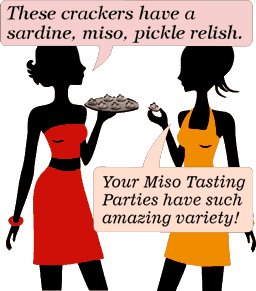 |
Wealthy people distort our culture
Our tendency to mask the
flavor of seafood with lemon juice, tartar sauce, and other spices
supports the accusation
that I made in other
documents; specifically, that the wealthy people who boast about eating
lobster and caviar are doing so only because
those
foods are expensive.
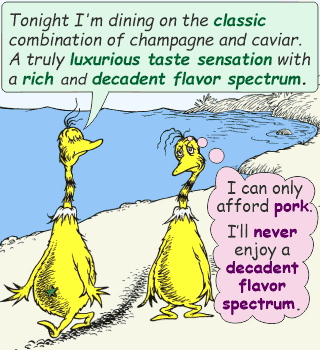
The people who describe
their foods with such adjectives as luxuries, delicacies, classic
combinations, sensory experiences, luscious, unmatchable in quality,
and unrivaled culinary sensations, are masturbating.
They are stimulating their emotional craving for status. They are trying to feel important.
The wealthy people are not providing
us, or themselves or their family, with sensible leadership. Instead,
they are fooling themselves and other people. They are wasting their life on endless
attempts to feel important
and titillate themselves to extremes.
They inadvertently
have a detrimental
effect on our culture because instead of providing us with guidance
about
foods, gold, diamonds, automobiles, houses, and other things, they are distorting our view
of life by creating the impression that the only
way to fully enjoy life is to have lots of those expensive things.
I would not be surprised if some people would enjoy eating canned dog food
if they were told that they were among the privileged few to be offered
the outrageously expensive, French epicurean delight of fermented
Peacock livers.
Do we really prefer meat that
"melts in our mouth"?
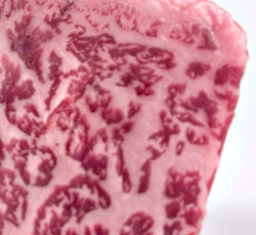 |
|
Wagyu beef
melts in our mouth because of its absurdly high
fat content. This type of meat is not "food";
it is "food pornography".
|
Many wealthy people boast
about eating Kobe beef, wagyu beef,
"Prime" beef, fillet mignon, and other foods that
"melt in our mouth".
Their boasting inadvertently reinforces the
attitude that
the less effort we put into
chewing our food, the more pleasure we
receive from eating the meal.
In a previous document I described
the meat that melts in our mouth as
"baby food for adults".
Does baby food really give us
the most satisfying meals?
The people who think so are probably following the Marquis de Sade attitude that we
will get the most
enjoyment from life by avoiding "work".
I previously pointed out that we love to eat crispy
foods, and I wonder if the
reason is because those foods force us to chew. We achieve more
satisfaction from something when we must do some work to earn it.
Therefore, I wonder if we prefer crispy foods because we must do some
work to chew it, which in turn brings us more satisfaction compared to
a food that doesn't require chewing, such as a soup.
I have been making meals for myself for more than 50 years, and when I
now look back at those meals, I notice that there were only a few times
when I made soup, or put food into a blender to make
something like a smoothie, eggnog, or milkshake.
| If it were true
that food that "melts in our mouth" gives us a better
life, then we would get the most satisfaction from our meals by putting
our food into a blender and creating a food
paste, and the
luxury restaurants would serve meals that are similar to the dinner in
the menu to the right. |
|
 |
I suspect that the reason I
was never strongly attracted to
soups, smoothies, eggnogs, and similar foods is because I prefer the
foods that require me to chew.
It is also interesting to note that we enjoyed putting extremely dry,
crunchy croutons into soups and salads, and we enjoy dipping dry bread
products, such as biscotti and dry cookies, into coffee, tea, or other
liquids. I think this is more evidence that we get more satisfaction from our meals when
we can chew our food.
When I was in junior high school, my mother made an eggnog for me in
the morning, but I regarded the eggnog as a quick and simple breakfast,
not as a "meal".
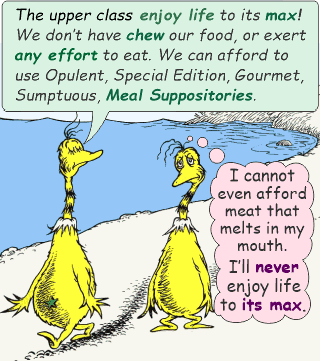
When I make a porridge, I
prefer it to be so extremely thick
that I can turn the bowl upside down without any of it falling out.
When we eat beef that is "tough", we have to cut it into smaller
pieces, and we have to spend more time chewing it. This causes many
people to believe that they are suffering because they have to do so
much "hard work".
I think most people would get more pleasure from their meals if they
changed their attitude from believing that work is bad to learning to enjoy work. I think that
chewing our food brings us more satisfaction, and it makes the meal
take
longer, which allows us to enjoy the meal for a
longer amount of time.

Of course, there is a point
at which the work involved with chewing is too extreme, but
exactly how much chewing is "too much" depends upon the
person's physical characteristics.
This concept applies to all types of work, not just chewing.
An obvious example are the men who can enjoy working all day to make
a rock or brick wall, whereas some of us would become
sore and exhausted after less than an hour.
Likewise, the amount of chewing that becomes "excessive" depends upon
a person's teeth, mouth muscles, and ability to produce energy. The
foods that I consider to "require chewing"
might be considered as "melting in our mouth" to the men with much more
stronger jaws and much higher levels of energy production.
Meals will be noticeably different in Kastron
With appropriate
leadership, meals would not be
designed to allow some people to feel special, or to pander to the
public, and
especially not to pander to children. Instead, the meals would be
designed according to the effect
they have on society and on people's health,
attitudes, activities, and relationships.
For a simple example,
imagine the Kastron government conducting an
experiment by having some of the pizza restaurants providing round
pizzas that are cut into large, pie
shaped wedges, just like the pizzas at most
restaurants today.
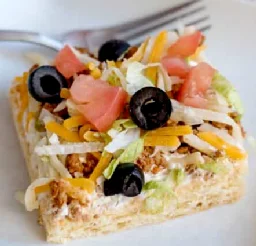 |
|
This piece of
a taco pizza could be cut into four, bite-sized
pieces.
|
The other restaurants would
be required to make the pizzas as rectangles,
and
then slice them into small, bite-sized pieces. They would be
smaller than the piece of pizza in the photo to
the right so that they don't need to be cut any further.
The pizzas would be identical in regards to their ingredients, flavor,
and consistency. The only difference between the pizzas would be initial shape of the pizza, and the
size and shape of
the pieces.
The difference in the initial shape would
affect how easy it is to make
and cook the pizzas, and the size and shape of the final pieces would affect how people eat the pieces.
The bite-sized "pizza bits"
would be messy and awkward to pick up with our fingers, so the
restaurant would provide forks.
The government would then analyze the restaurants to see what effect
the pizza bits were having on the people and on society. Three
of the conclusions that they might come to are:
| 1) |
|
It is much easier
and quicker to produce rectangular
pizzas because machines can easily produce rectangular sheets of dough,
cover them with virtually any topping, bake them, and then slice them
into rectangular pieces. Also, the machines can be smaller and simpler
compared to machines that have to create round pizzas and reprocess the
scraps of dough between the round pieces. The government would
conclude that the rectangular
pieces have an advantage to society.
|
|
|
|
2)
|
|
By observing the
people as they eat
the
pizzas, the government might notice that the people eating the
pizza bits require more time
to finish the meal.
In a free enterprise system, a restaurant wants customers to eat quickly and leave, but the government might
notice that the people are spending more time enjoying the meal, the
people they are with, the
decorations in the restaurant, the
view out of the windows, and the displays of flowers,
butterflies, or minerals that are on the tables or walls. Therefore,
the government would conclude that the pizza
bits are an advantage
because they are providing people with more enjoyment from meals for
the same amount of food. |
|
|
|
3)
|
|
The round pizzas
have a lot more "bare crust", which most people don't care much for.
Therefore, the rectangular pieces have an advantage. |
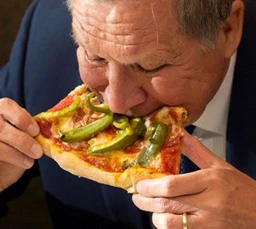 |
|
Is eating like
an
animal the best
way to enjoy the food and the people we eat with? Will it provide us
with the most satisfying
life? I don't think so.
|
The culture in the USA puts a lot of pressure on us to eat large pizza
wedges with
our hands. For example, when
John Kasich was governor of Ohio, there
was a time he began eating a wedge of pizza with a knife and fork, and
he was pressured
by other people to pick up the wedge with his
hands and shove it into his mouth ( photo
to the right).
We have a natural tendency to shove large amounts
of food into our mouth, and to eat quickly,
because we are animals,
and animals evolved for a deadly competition
for food.
In Kastron, the people in leadership positions are expected to do what
is best for us, not pander to
our crude, animal
cravings.
If the government decides that forcing people to eat pizza with a fork
causes them to get more overall enjoyment from their meal, and that it
is easier for society to produce that type of pizza, then the
government
will order all of the
pizza restaurants to switch to making bite-size pieces.
Restricting food freedom can improve our
lives
Putting restrictions
on
our food freedom, and allowing the government to collect data about us,
will be miserable only if
we allow incompetent or dishonest leadership. If we can
provide
ourselves with leaders who are truly concerned with improving our
health and lives, we will benefit significantly
from the restrictions and the collection of data.
In addition to getting better quality and healthier meals, we will
reduce the waste of food because the farmers and restaurants will be
able to plan
the meals. This will reduce the amount of labor and resources we need
to produce and process food.
Scientists do not yet know enough about health and nutrition to design
meals that are ideal for us,
but they will be able to slowly improve the meals by collecting data
about us, and passing judgment on how their food policies are affecting
our physical and
mental health.
Everybody benefits when scientists design meals that keep us in good
health because it will reduce the burden on our healthcare system, and
the healthier children will do better in school, and the healthier
adults will be more productive at their jobs.
Furthermore, the healthier people will be more pleasant and active
during their leisure time, thereby allowing them to participate in
social and recreational activities rather than lounging at home like a
sickly, fat pig.
We should also allow citizens to volunteer for experiments. For
example, a person who is suffering from digestive problems or excessive
mucus production could volunteer to experiment with his foods in order
to see if his problem is food-related. This would be better than him
conducting the experiments by himself because he will have scientists
and doctors to assist him with the analysis and experiment.
We could have truly fresh meat
With appropriate
restrictions on our food freedom, the Kastron
restaurants will be able to operate as efficiently as the kitchens on a
submarine or a school. For example, by not providing menus, they will
be able to plan meals weeks in
advance, and they will not have
to store a variety of foods that they hope some customer eventually
purchases. Instead, they will order the meat, fruits, and
vegetables only when they need
the items for an upcoming
meal.
None of the restaurants
would have meat, vegetables, or fruits in
storage and slowly deteriorating in quality. This will reduce the
number of, and/or the size of, the refrigerators, freezers, and storage
cabinets at the restaurants, which reduces the labor and resources
necessary to build and maintain the restaurants. It also reduces the
amount of space that the restaurants need.
Animals would be butchered only when we want to eat the meat, giving us
access to truly fresh meat. This will be most significant for the meat
that deteriorates quickly, such as fish, chicken, and pork.
It is conceivable that we could design a city in such a manner that
those animals can be butchered, and the meat sent directly to the
restaurants for meals that same day, rather than stored in a
refrigerator.
This would provide
the restaurants with meat that is still warm. This would have the
additional benefit of reducing the labor and energy
that is needed for cooking.
The Kastron restaurants are not buffets
Although it might appear as
if the Kastron restaurants will
be similar to the smorgasbords and buffets of a free enterprise
systems, the Kastron restaurants will be significantly different.
The smorgasbords and buffets produce enormous amounts of food because
they don't know how many people are going to eat at the restaurant, or
what they want to eat, which results in a lot of food becoming cold or
wasted. By comparison the Kastron restaurants will resemble the dining
rooms in people's homes. To understand the concept of the Kastron
restaurants, consider what it is like to have dinner at a friend's home.
When a person invites some friends or relatives to their home for
dinner, they know
exactly how many people they are going to feed, and they produce food
only for that number of people. Furthermore, they do not provide the
guests with menus, or provide them with a gigantic buffet that has
an excessive amounts of food.
The restaurants in Kastron will feel as if you are going into
somebody's home to eat. Each restaurant will provide a particular type
of meal, and there will be very few options. Furthermore, each
restaurant will have planned for a certain number of people. If more
people go to a particular restaurant than they have planned for, the
excess people must go to another restaurant that still has capacity.
Therefore, the people who arrive at the restaurants early will have the
widest choices in foods.
People without reservations can look on a computer or phone to see a
map of the restaurants, along with their current status in regards to
whether
they are open, and the number of vacancies. It would be similar to how
airlines allow
us to pick a seat from a map that shows which seats are still
available, except that
there would be no
fees. In addition, by tracking the people in the city, we would be
able to use the map to
find out who is eating at a
particular restaurant, or which restaurant a particular person is at.
Why is beef aged for weeks?
It is interesting to note
that beef
is
deliberately allowed to remain in a refrigerator
for 2 to 4 weeks, and sometimes for 8 or more
weeks. We describe this as " aging"
the beef, but it would be more accurate to describe it as allowing the
meat to deteriorate, decompose, decay, or degrade. Why do we want
chicken, fish, pork, lamb, and other meat to be extremely fresh, but
not beef?
I have never had fresh beef,
so I don't know what
is wrong with it, but the documents that explain the aging process
claim that
there are two reasons for letting it decompose for many weeks:
| 1) |
|
We dislike the flavor
of fresh beef.
This
document describes fresh beef as having a metallic
flavor. |
|
|
|
2)
|
|
We cannot
easily chew fresh
beef.
Apparently, fresh beef is so tough that it is difficult for our
mouth to chew. By allowing the beef to decompose for several weeks,
it
becomes soft enough for our weak jaw muscles. |
The fact that we dislike the taste and toughness of fresh beef is an
indication that our prehistoric ancestors did not evolve to eat fresh beef.
Therefore,
we ought to investigate whether eating deteriorated
beef is healthy for
us. If fresh beef is
healthier, then we should experiment with other methods of dealing
with its metallic flavor and toughness, such as grinding
the beef for sausages, tacos, and burgers.

We like to imagine that our
prehistoric ancestors were courageous hunters who caught
mastodons and woolly mammoths, but it is possible
that our ancestors usually ate those big animals when they found
them dead, in which case the
meat would have been partially decomposed. Maybe that is why we have a
preference for decomposed beef.
Furthermore, regardless of whether they caught a large animal or found
it dead, there would have been so much meat that they would have been
able to eat meat from it for many weeks, which
meant that the final meals consisted of meat that was extremely old.
That would also help to explain why we prefer decayed beef.
The scientists who study humans should control their arrogance so that
they
stop twisting history to glorify humans. When I compare the skeleton
and jaw of a
Cro-Magnon to a Neanderthal, I wonder how the Cro-Magnon hunted giant,
woolly mammoths, and how they chewed the meat. It seems to me that the
scrawny Cro-Magnon men would be more likely to chase
after pigs and other small animals. Besides, how many woolly mammoths
and other giant animals were living among the
Cro-Magnon?
Perhaps only the Neanderthals
regularly hunted the large animals, which would explain why their
bodies and jaws were so much more massive and powerful. They did not need
those jaws to eat pork, lamb, rabbit, or trout. Evolution cannot give a
creature a powerful jaw unless it truly needs
it.
We could have truly ripe fruits
By making everybody get
meals at restaurants, and by allowing the restaurants to plan their
meals ahead of time, the farmers in Kastron would be able to
pick fruit that is ripe because
the fruit would go directly to the restaurants for a meal, rather than
be put on
display at a market where it might remain for many days, and be
squeezed over
and over by consumers.
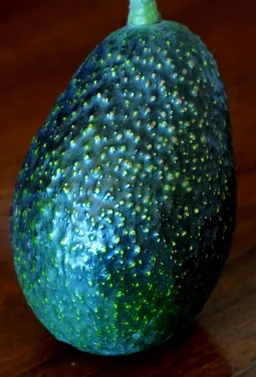 |
|
I pick Haas avocados when they
start to turn black, like this one.
|
If I had never had
homegrown and fully
ripened apricots, peaches, loquats, figs, oranges, and certain
other fruits, I would never have realized how wonderful they taste.
Allowing lemons and oranges to remain on the tree for a much longer
period of time
will reduce their bitterness, also.
I don't pick Haas avocados
until they start to develop black spots. They
become noticeably better tasting than those from the markets, which are
usually picked while they are entirely
green.
The avocados in the market also tend to become bruised to an extreme
because they are dumped into bins at the farms, as if they are as tough
as rocks, and then consumers squeeze them over and over.
In order to provide ourselves with fruit that is truly ripe and free of
bruises, we need to put more of our technical talent and resources
into developing machines that can harvest, transport, and handle fruit
in a more
careful manner.
Robots would make small meals practical
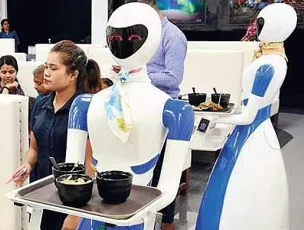 Robots
can already do simplistic tasks, such as deliver food to restaurant
customers ( photo),
but eventually they will be able to produce meals, deliver them, and
pick up the used plates.
That will make it practical for robots to provide
us lots of small meals rather
than one large meal, which would allow the
food to remain fresh and warm (or cold).
Specifically, instead of having all of the food delivered to the table
at one time, the robots would bring each person a small plate with a
small amount of food. The plates could be designed with a metal
interior to retain heat (or to remain cold). This would allow everybody
to have a small portion of food.
The people would then have the option of telling the robots to bring
the next portion, or they could relax at the table and socialize a
while.
By eating a meal in this manner, everybody would have fresh food, and
each person would have the option of going to a different
restaurant
for each portion. For example, a person might begin his meal at a
restaurant
that provides a small amount of pizza, and then walk to a
different restaurant
to get a small
piece of roast beef, and then walk to a different restaurant to meet
some other
people and get a small enchilada.
Nutritional bars could be
designed for each person
The future generations will
eventually have the technology to put everybody through routine medical
analyses, and their computers will be able to observe what everybody
eats during the day, and estimate the amount of exercise each person
gets. This would allow their computers to create nutritional bars
with the appropriate vitamins, minerals, drugs, and/or
hormones that each person needs
for the upcoming month.
|
|
Imagine
computers
designing nutritional bars for you, and for
a specific time
period, based on your medical
history, food preferences, and activities, and the expected weather
conditions in your city for that particular time period. |
|
 |
An elderly person, for
example, might be given a nutritional bar with higher levels of vitamin
D than a younger person who has a better digestive system, and who is
getting more exposure to sunlight, and who has skin that produces
vitamin D more efficiently.
The computers would also adjust the nutritional bars for the weather. For example, in the cities
with cold winters, the computer might increase the level of thyroid
hormones for the people with low thyroid levels, and who spend a lot of
time outdoors.
The nutritional bars could also provide whatever enzymes or substances
are needed to help people digest food and create cleaner, less stinky
poop.
Incidentally, different foods affect the smell of our pee. For example,
asparagus makes it smell terrible, but some foods and spices make it
more pleasant. If we can identify the chemicals that give it a pleasant
odor, and if those chemicals are harmless, then mothers could give some
of the chemicals to their babies in order to make diapers less stinky.
Some adults might also add it to to their foods to make their own pee
smell better,
especially the older adults who pee
throughout the day and night.
Soaking and sprouting
requires resources
If we decide to soak or
sprout seeds, then we will
make our meals more
expensive because those operations require equipment,
electricity, and labor. Water is also needed, but
the waste water
can be used for irrigation ( since we are having a drought in the
western
USA, I put the waste water on the plants in my yard).
It might also be best to replace the water several times during the
soaking process in order to remove more of the unpleasant chemicals,
especially if the seeds are soaking in a small amount of water. The
water immediately begins to
pick up the bitter chemicals and unpleasant odor, so I replace
the water 4 to 6 times over the 6 to 10 hour soaking period before the
water
finally remains fairly clean.
Replacing the soaking water several times will further increase the
amount of water we use,
and
the complexity of the equipment and software.
The expense of soaking and sprouting seeds brings up the issue I
mentioned in my
crispy popcorn document.
Specifically, I suggest that we switch our priority from titillating
ourselves with status products, trophies, sugar, and "freedom",
to experimenting with methods to truly improve our
relationships, health, cities, recreational activities, work
environments, and other
culture.
So, find your pioneer
spirit,
and let's start experimenting
with improvements!
|

